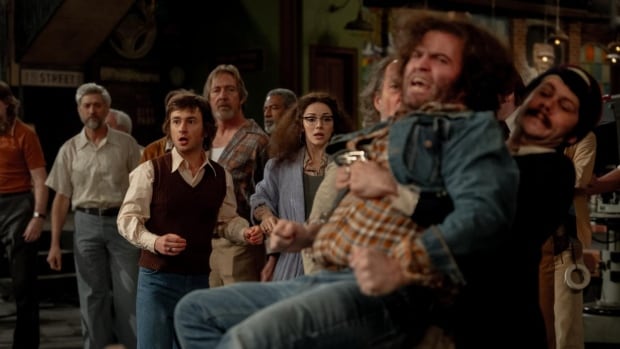
It’s time to put on makeup
It’s time to dress up right
It’s time to get things started
Why don’t you get things started?
Watching the backstage bedlam of Jason Reitman’s Saturday Night made me think of The Muppet Show.
And it’s not because the film throws my beloved Jim Henson under the bus, portrayed here by Nicholas Braun as a prudish hippie getting pranked by the Saturday Night Live staff.
It’s because the entire conceit of Saturday Night, which shows us the 90 minutes before the first episode goes to air, plays like a live-action version of The Muppet Show, complete with special guest stars (a disgruntled George Carlin) and a plethora of subplots: Is Chevy Chase’s ego too big for the cast? Will John Belushi sign his contract?
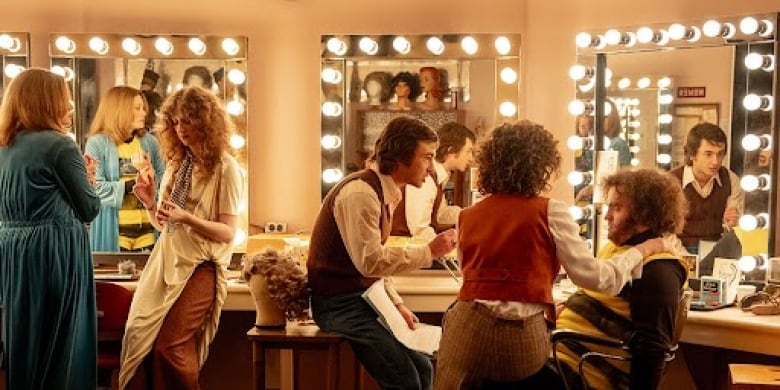
Not to mention Lorne Michaels — the Kermit of this analogy, waving his arms frantically in the air — the Canadian comedic wunderkind trying to convince NBC to risk 90 minutes of air time on a group of unknowns.
The film is the latest from director Jason Reitman, son of director Ivan Reitman, who burst onto the scene with zippy caustic comedies such as Up in the Air and Juno. Oscar bait for voters, those movies announced Reitman as an exciting new Hollywood auteur.
But in the past few years he has disengaged with the present in favour of an extended spelunking of nostalgia, from his Gary Hart movie The Front Runner, to his reanimation of his father’s Ghostbusters franchise, directing Ghostbusters: Afterlife and executive producing Ghostbusters: Frozen Empire.
WATCH | The official trailer for Saturday Night:
90 minutes to show time
Sticking firmly to the past, Saturday Night is a ticking clock of a film set in real time on Oct. 11, 1975, during the last 90 minutes before the show goes live for the first time.
The network is embodied by Willem Dafoe as NBC’s head of talent, Dave Tebet. Costumed in a sharp suit and spectacles, Tebet’s shallow smile suggests there’s little faith in the experiment. There’s already a tape of a Tonight Show rerun cued up if Michaels fails.
Reitman and co-writer Gil Kenan illustrate the changing of the guard with J.K. Simmons appearing as Milton Berle, a relic from the so-called golden age of television when millions would tune in to watch Uncle Miltie.
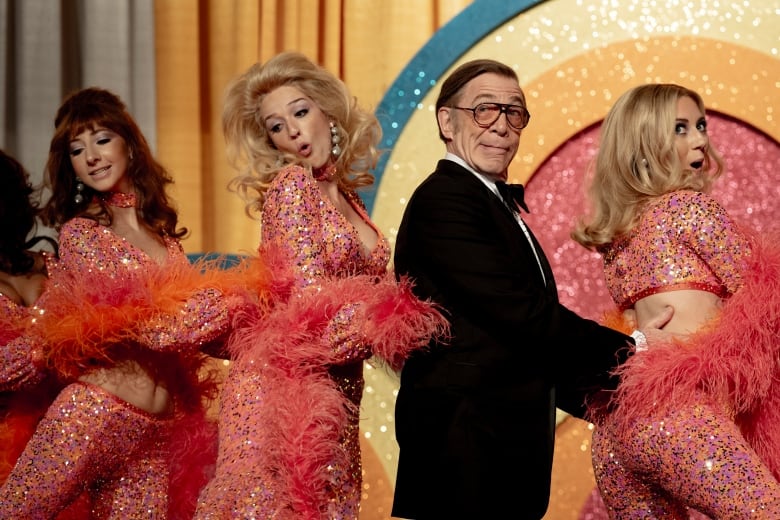
Simmons is in high camp here, one moment doing the cha-cha with chorus girls, the next marking his territory by whipping out his legendary schlong for shock effect.
Not that this version of SNL is genteel. If anything, what Reitman and the cast channel is a gonzo sort of energy. The backstage at studio 8H, with its serious summer camp vibe, is a realm of barely contained chaos.
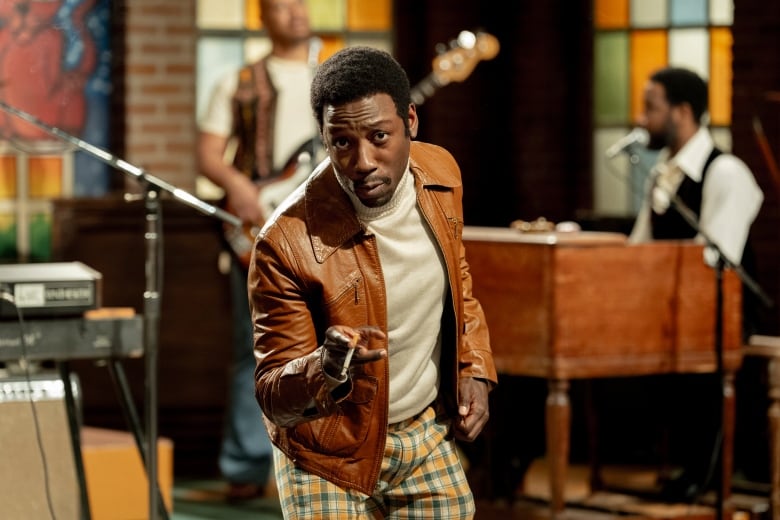
Recreating the cast
Indeed, one of the most successful aspects of Saturday Night is the inspired casting that uses a great mix of modern emerging talents to portray the fresh faces who would soon become famous.
Cory Michael Smith’s version of Chevy Chase vibrates with ambition and arrogance. Nicholas Podany’s Billy Crystal is sexy, smart and sad. Ella Hunt as the singular Gilda Radner has just a few moments, but channels a playful spark. Dylan O’Brien’s Dan Aykroyd is goofy and endearingly awkward. Tommy Dewey as head writer Michael O’Donoghue is a sharp-tongued assassin.
Lamorne Morris makes a meal out his part as Garrett Morris (no relation), the classically trained singer frustrated as the token Black member of the cast.
And Shiva Baby’s Rachel Sennott appears as Rosie Shuster, Michaels’ wife and co-writer. While the state of their relationship appears nebulous, Sennott brings a game screwball energy to the part.
The cast of Saturday Night, including Canadian Gabriel LaBelle as SNL creator Lorne Michaels, walked the red carpet as Jason Reitman’s film about the comedy mainstay’s origin made its Canadian premiere at the Toronto International Film Festival.
But the biggest bump when it comes to this portrait of SNL in its infancy is Canadian actor Gabriel LaBelle as Michaels.
Throughout his decades behind the scenes at Saturday Night Live, many things have been said about Lorne Michaels, but no one is neutral when it comes to his long-running reign. Some celebrate his genius and ability to surf the zeitgeist, while others see him as a fickle and mercurial ruler who plays favourites.
But the Lorne Michaels we meet in Reitman’s version is a twinkle-eyed optimist with camp counsellor energy. It’s hard to see LaBelle as the kind of guy who could contain the chaos of SNL, nevermind make the tough decisions to get it on air. But in the film, Michaels exudes an unshakable sense of confidence, perhaps because we know how it ends.
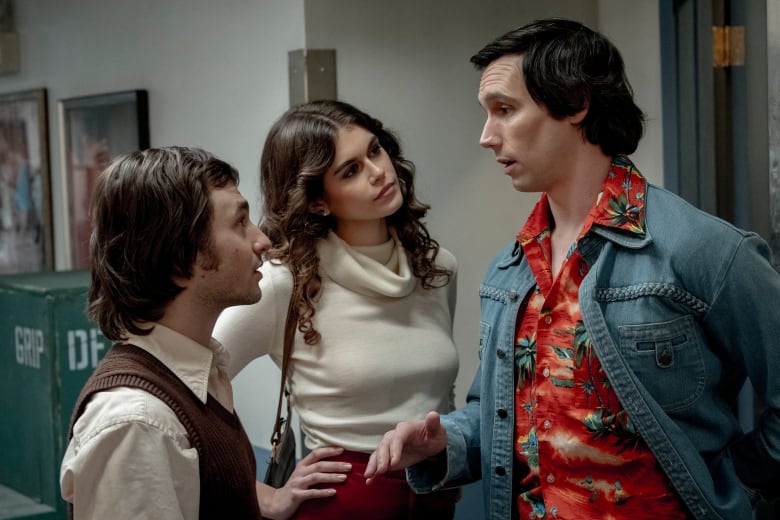
And here we come to the Achilles heel of Reitman’s film.
When Saturday Night Live first burst onto television, it was a revolutionary leap into the unknown, as America in ’75 was at a turning point. Michaels had worked on Laugh-In and written jokes for Phyllis Diller. He had seen the stultified way TV comedies were made and assembled a group of improv anarchists to try something new.
What’s missing among all of Reitman’s camera choreography that follows the cast as workers literally build the stage brick by brick(!), is the sense of danger.
There is no risk in Saturday Night. It’s a museum piece — a carefully constructed recreation to polish the myth of the man who started it all.
Entertaining? Undoubtedly. But it doesn’t feel revolutionary. Just inevitable.
